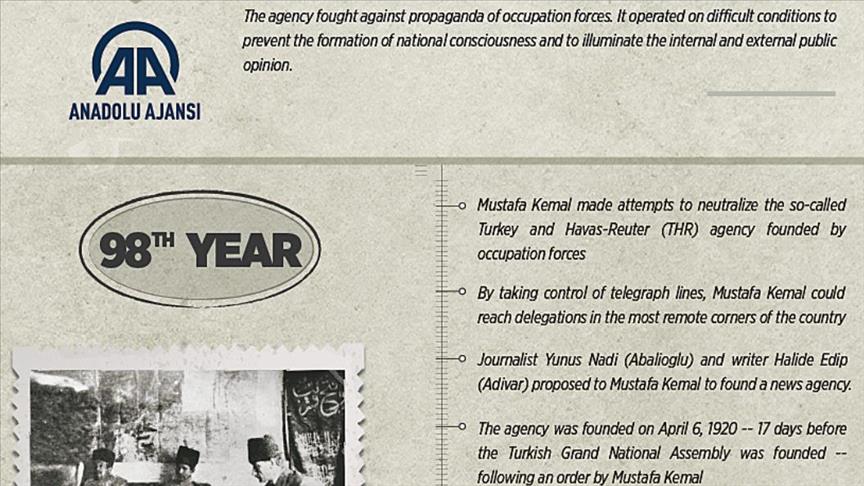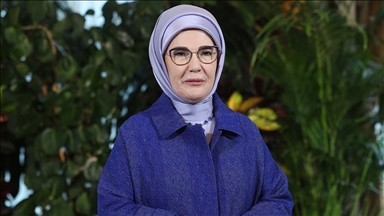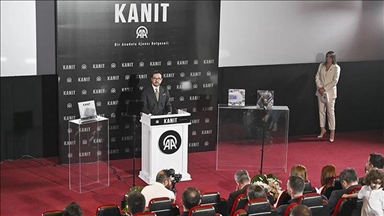Anadolu Agency's heroic duty during War of Independence
History of Anadolu Agency is almost identical to Republic of Turkey

Ankara
By Ersin Altinsoy
ANKARA
Anadolu Agency was founded during Turkey’s War of Independence and became a symbol of national resistance against attempts to occupy Turkish territory.
The agency was founded in 1920 and it is now celebrating its 98th anniversary.
The history of Anadolu Agency is almost identical to that of the Republic of Turkey.
The agency was founded on April 6, 1920 -- 17 days before the Turkish Grand National Assembly (TBMM) convened for the first time.
Anadolu Agency had even helped announce the first legislation of the Assembly that established the Republic.
The agency had witnessed all stages of the National Struggle, the War of Liberation and reforms of the Republic.
The agency was founded by the Republic's founding father, Gazi Mustafa Kemal, on April 6, 1920, in order to prevent the propaganda of occupying allied forces and their local collaborators by means of spreading unfounded news aimed at hindering the National Struggle and hampering national morale; 98 years later, it continues to operate with this mission in mind.
Anadolu Agency was established at the behest of Ataturk by writer Halide Edip (Adivar) and journalist Yunus Nadi (Abalioglu) in order to “promote Anatolia’s voice to the whole world."
The agency is conveying its experience to a new generation of journalists and fulfilling the mission of its founders.
After Istanbul came under occupation on March 16, 1920, and the Ottoman parliament was annulled, Ataturk urged all provinces to hold elections for a new parliament to be established in Ankara.
Several intellectuals, who realized that they could not stay in Istanbul any longer, tried to join the National Struggle. This development later paved the way for the foundation of Anadolu Agency.
Those intellectuals leaving Istanbul went to Ankara in two convoys. The journalist, Yunus Nadi (Abalioglu) and the writer, Halide Edip (Adivar), decided that it was necessary to found "an agency organization" in Ankara as soon as possible.
They agreed to name the media outlet "Anadolu Agency."
During the War of Liberation, Anadolu Agency kept the people of the country informed about what was going on in the rest of the world.
The agency also struggled against
Ataturk’s historical memorandum
Ataturk not only announced the establishment of Anadolu Agency with the historical memorandum he sent out throughout the country, he also pointed out the importance of the National Struggle, both in the country and abroad.
He sent the memorandum on April 9 to all branches, provinces and detached brigades and National Struggle delegations.
“The news and information provided by Anadolu Agency must hang on walls, the streets.
“Those agency declarations should be distributed to all neighborhoods and villages through the fastest means. It’s very important that all necessary measures must be taken in order to publish Anadolu Agency’s information as quickly as possible. After
Anadolu Agency news, which back then used to be published through at least two bulletins each day, were given great importance and reached all corners of the country.
On May 5, 1920, another memorandum was published bearing Ataturk’s signature. It was decided to use all means available for the delivery of the bulletins everywhere in the country.
After Ataturk assigned some of his closest friends to make the agency at par with Western news agencies, the Anadolu Agency Corporation was established on March 1, 1925. The agency acquired an autonomous status with an exemplary organizational chart that was even ahead of Western countries.
Istanbul sea route used
Ataturk had sent a message to the 61st Division Command in Balikesir, ordering a regular delivery of Anadolu Agency bulletins from Bandirma to Istanbul via reliable boatmen and ferry captains, which carried important news items after the opening of the Grand National Assembly.
Anadolu Agency had also delivered news over telegraphs under dire circumstances and difficult conditions. At times it even reproduced news using
The agency, which contributed to a national awakening both in Istanbul and Ankara, made history during the War of Independence when its secretly bulletins delivered news from Anatolia to Istanbul.
In a short period of time, the increasing influence of the bulletins came to irk allied powers, which saw the role of the Anatolian agency in the National Struggle. The allied powers then made an attempt to develop strategies against the Ankara government.
British envoy complains
British High Commissioner Admiral John de Robeck mentioned the agency in his report on May 22, 1920: "The nationalists have recently set up a news agency that also publishes daily news bulletins. These come to Istanbul with a certain delay.
“They contain some news about what is happening in Ankara. The most striking feature [of these bulletins] is to propagate enmity against France in Cilicia and Syria in some extent but mostly against the allied states, including Britain.
“It blames the British for the occupation of Istanbul and the allied states’ harsh attitude against the Turks. The difficulties the British government faces all over the world from Ireland to India are exploited.”
According to intelligence that the British received from Samsun back then, it was revealed that the agency newsletters were printed at printing houses and sold for 100 monies for the benefit of Daryl Eytam (orphans dormitory).
Secret deliveries
The
The volunteers who carried out this sacred task, which was as dangerous and as important as weapon smuggling to Anatolia, are examples of Anadolu Agency employees’ role in the National Struggle.
In the first phase, the agency listed the service of two men: Akif Bey, the former owner of Farmer's Library, and the second is Hayri Budak Bey, who was a retired employee of the agency's accounting service.
Akif Bey was a young man who believed in the Turkish national cause. We could say the Babiali police and the soldiers of Allied States would never miss him because of his activates, which included collecting intelligence for Anatolia and safeguarding and distributing the news and bulletins of Anadolu Agency sent from the Anatolian coast of Marmara.
Hayri Budak used to wait on the Sirkeci dock for swabs, sandals, fishing boats or steamers coming from Anatolia. When he realized, it was coming, he went to the vessel, picked up the bulletins and took it directly to the Farmer's Library. This seemingly simple task turned out to be a great service to the struggle. One day, when he was leaving on a small steamer, a Senegalese-origin French soldier hit his arm with an
Hayri Budak still carried on and kept newsletters in his armpits despite his horrible condition and continued making deliveries to the Farmer's Library.
Arrested for spying
Hayri Budak recalled: "We were two friends in Istanbul. We had a place in the Farmer's Library and a pedal mechanism in the basement. With
Our communication with Anatolia was maintained via Zonguldak and Izmit. The General Directorate of Publications and Intelligence -- at that time Anadolu Agency was affiliated to this directorate -- had two intelligence bureaus in these cities.
The secret documents, propaganda material, newspapers, pamphlets and papers sent from Ankara to Zonguldak were given to one of our men aboard a ship, and he delivered them to me and my friend Sirri in Istanbul. Rest of the work was done by us. We were trying our best to distribute this news of Anatolia among the people of Istanbul. We could only continue this communication between Zonguldak and Istanbul with the ferry of the French Pake Company
French bulletins to Washington
Despite all the difficulties, the Anadolu Agency tried to announce the voice of the righteous struggle in Anatolia with the French
In time, the agency's bulletins have begun to gain respect to foreigners as it was understood the news that the agency has published were true and the news published by the occupation forces were false.
Anadolu Agency’s French bulletins were among reports sent to Washington by the American High Commissioner Admiral Bristol. This indicates that the agency was also the voice of the National Struggle and followed [from abroad too].
In response to misinformation spread by the Greek Headquarters regarding the First Inonu War, Anadolu Agency responded with the following newsletter to inform the public, both inside and outside the country:
“The Greek Headquarters did not publish its official declaration from Jan. 11 to 16, 1921. The delayed declaration, published on Jan. 17, described the Greek operation as a simple reconnaissance attack and tried to diminish the significance of this operation. We respond in this way: They must be 150 kilometers away from where they started attacking, which prevents it from being considered as a reconnaissance attack.
“They have suffered great losses and retreated in defeat. Previously, the Greek Headquarters declared advance of its units to Bilecik and Bozuyuk as a definite success. Then describing the operation as a reconnaissance attack is a strange contradiction."
Turkish army’s entry in Izmir
The victory of the Great Offensive and Turkish army’s entry into Izmir was a turning point for Turkey. In Istanbul, the people who opposed the National Struggle of the Ankara government were surprised while the people who believed in
Anadolu Agency journalist Hayri Budak describes how this great news was announced by the agency in Istanbul:
"The Great Attack had begun, and the people of Istanbul were waiting for news from Anatolia with curiosity and enthusiasm. We got the news at midnight.
“The first division of our army arrived in Izmir and the city was waiting for Mustafa Kemal. We started the pedal machine in tears of joy. After a while children took to Istanbul streets with bulletins in their hands and cheering 'Agency,
“That night, Istanbul was celebrating…Thousands of people in Kadikoy took the streets carrying torches … the celebration continued until the next morning in Fenerbahce."
Anadolu Agency has over 2,000 subscribers in 50 countries and publishes news in multiple languages.
Anadolu Agency currently broadcasts in Turkish, English, Arabic, Russian, French, Kurdish, Bosnian, Croatian and Serbian (BCS), Albanian, Persian, Macedonian,
Nearly 2,400 people from 107 nations work for Anadolu Agency in some 86 countries where it has offices.
Anadolu Agency, “the source of reliable news,” posts an average of 2,200 news stories, 2,300 photos, 400 video news reports, 15 live broadcasts and 8 infographics on a daily basis.
As part of its centennial vision, the agency aims to become one of the world's most influential agencies by 2020.
Anadolu Agency website contains only a portion of the news stories offered to subscribers in the AA News Broadcasting System (HAS), and in summarized form. Please contact us for subscription options.






